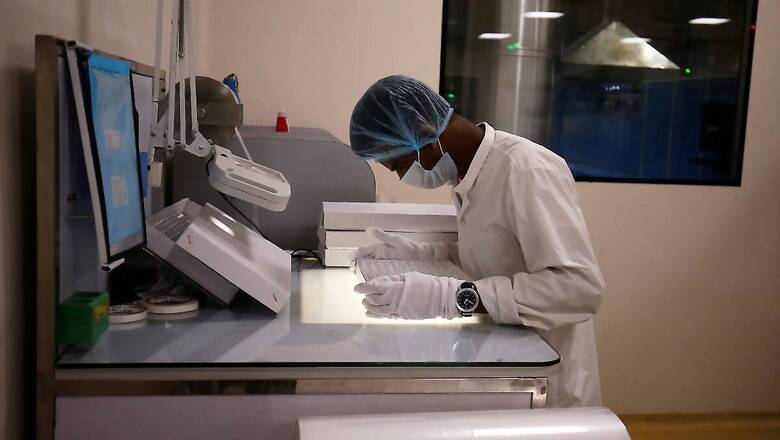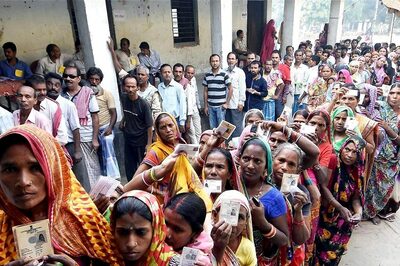
views
The Central government said on Saturday that more than 50 samples of returnees from the United Kingdom, which recently found a potentially more infectious variant of novel coronavirus in its population, are currently undergoing genome sequencing at the designated laboratories across the country.
The genome sequencing study would determine if the Covid-19 positive patients were carrying the existing strain of SARS-CoV-2 or the mutant strain which was discovered in the UK.
“A genomic surveillance consortium, INSACOG, has been formed under the leadership of NCDC, New Delhi, for laboratory and epidemiological surveillance of circulating strains of SARS-CoV-2 in the country. Further, more than 50 samples of UK returnees are currently under sequencing at the designated laboratories,” said the government in a statement.
Other laboratories in the consortium are: National Centre for Disease Control (NCDC), CSIR-Institute of Genomics and Integrative Biology in Delhi, CSIR-Centre for Cellular and Molecular Biology in Hyderabad, DBT-Institute of Life Sciences in Bhubaneshwar, DBT-National Institute of Biomedical Genomics in Kalyani, DBT-InStem-National Centre for Biological Sciences in Bengaluru, National Institute of Mental Health and Neurosciences in Bengaluru and ICMR-National Institute of Virology in Pune.
“It has been proposed to continue enhanced genomic surveillance for early detection and containment of the UK variant of SARS-CoV-2 strains. However, it is important to understand that like all other RNA viruses, SARS-CoV-2 will continue to mutate. The mutated virus can also be contained by measures like social distancing, hand hygiene, wearing masks and also by an effective vaccine, as and when available,” the statement further read.
The British government had recently announced that the newly identified strain of the virus found in its population is up to 70 per cent more transmissible and is “out of control”. This prompted Indian authorities to suspend flights to and from the UK between December 23 and December 31.
Several people who came to India from the UK in the past few days have tested positive. According to the government’s strategy, 5 per cent of the positive cases from all states and Union Territories will also be tested for whole genome sequencing.
Meanwhile, a meeting of the National Task Force (NTF) on Covid-19 was convened on Saturday by the ICMR under the co-chairpersonship of Vinod Paul, Member, Niti Aayog, and Balram Bhargava, Secretary, Department of Health Research, and Director General, ICMR. The meeting was also attended by AIIMS Director Randeep Guleria, among others.
The main objective of the National Task Force is to discuss evidence-based modifications in testing, treatment and surveillance strategies for SARS-CoV-2 in view of the recent reports of emergence of a new variant strain of the virus from the UK.
The variant strain has 14 non-synonymous (amino acid altering) mutations, 6 synonymous (non amino-acid altering), and 3 deletions. Eight mutations are present in the Spike (S) gene which carries the binding site (Receptor Binding Domain) of the ACE2 receptors, which are the point of entry of the virus into the human respiratory cells.
The National Task Force deliberated in detail the aspects related to the current National Treatment Protocol, testing strategy and surveillance of SARS-CoV-2 vis-a-vis the UK variant strain.
It was emphasised that since the UK variant strain is implicated to cause increased transmissibility of the virus, it is critical to identify individuals infected with this strain and adequately contain them to prevent its transmission in India.
The task force concluded that there is no need to change the existing treatment protocol in view of the mutations emerging in the strain. Further, since the ICMR has always advocated the use of two or more gene assays for testing SARS-CoV-2, it is unlikely to miss infected cases using the current testing strategy.
The NTF recommended that in addition to the existing surveillance strategies, it is critical to conduct enhanced genomic surveillance for SARS-CoV-2, especially in incoming passengers from the UK.
Besides, it will also be critical to conduct genome sequencing in samples where there is dropout of the S gene in lab diagnosis, proven cases of re-infections etc.
The National Centre for Disease Control informed that the government of India has taken cognisance of the reports of the mutant variant of SARS-CoV-2 reported from the UK and the response of other countries to these reports. The situation is being monitored proactively. A strategy has been put in place to detect and contain the mutant variant.
Read all the Latest News, Breaking News and Coronavirus News here



















Comments
0 comment